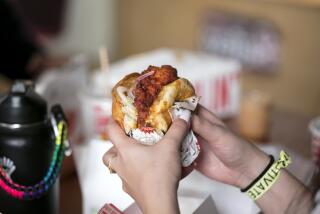Our unexplained cravings
- Share via
When life gets tough, the stressed often get hungry.
Exactly how many people experience stress-related eating isn’t known since there are no national surveys to measure it. But there’s growing scientific interest in the topic.
“Fight or flight is the normal response to stress,” says Tatjana van Strien, professor of psychology at Radboud University in the Netherlands. “All the blood goes to the muscles so that you’re ready for action and not for eating.... So stress eating is highly unadaptive and highly strange.”
It’s easy to blame the urge to raid the refrigerator on job pressures, hectic schedules, family crises and personal conflicts.
“There’s definitely an association between stress and mood and increased eating,” says Michael Lowe, professor of psychology at Drexel University. “Loneliness, boredom, anxiety, depression, all of those fit in too.”
But new research suggests that there may be more at play. The latest findings show that people engaged in enjoyable activities that require mental focus overeat as much as those who are stressed.
“That suggests that there’s something more than negative emotions going on,” Lowe says.
Nor can the increased appetite be explained by additional caloric needs of the brain. “If you do cognitively demanding work, you see a small increase in brain energy, but not a lot,” Lowe says. “So why would mental work or stress make anyone want to eat more? It’s not like you’ve gone out and run five miles.”
What also intrigues scientists is that this superfluous eating doesn’t affect everyone equally. Those most susceptible are so-called “restrained eaters” -- people who watch their weight, whether successfully or not. Research suggests that they are more likely to overeat than those who don’t have weight concerns.
Add to that the 24-hour availability of food and you have what Lowe calls “a new kind of hunger.” “It’s reflected in the paradox,” he says, “that both the absence and the presence of food are capable of making us hungry but apparently in very fundamentally different ways.”
So although it makes sense physiologically that people are hungry four to six hours after eating a meal, it’s harder to explain why a plate of chocolate chip cookies can be so appealing shortly after a meal. “You’re not in a state of caloric deprivation,” Lowe notes. “But you experience the desire to have them.”
Scientists hope to better understand this kind of “hunger.” Until they do, people who are most susceptible to so-called stress or emotional eating will have to look for ways to minimize the caloric damage, Lowe says.
Jennie Geisler of Erie, Pa., has learned this lesson well. “About 9 a.m. after I’m at work for a little more than an hour, the cravings prey on my brain,” she says. “I try to suck on hard candy, gulp down decaf coffee, drink water, eat South Beach protein bars and Quaker oatmeal bars. That all helps.”
So does pacing how fast she eats. “Pick it up,” Geisler writes in an e-mail. “Take a bite. Put it down. Work for five minutes. Start over. If I don’t do that, I’ll eat 10 cookies without thinking about it.”
Physical activity helps Jody Nyers, a benefits analyst at the U.S. Department of Agriculture, cope with a long commute to work. She gets up at 3:45 a.m. and doesn’t get home until after 5 p.m. By mid-afternoon, she’s often craving sweet snacks. “If I’m tempted, I walk the half mile around the building,” says Nyers, who also leads spinning classes at her gym and has recently started doing yoga.
Even so, “it’s a battle,” she says. “We live in a world where everything comes in huge portions and there are so many foods to choose from.... I work out a lot because I love to eat.”






